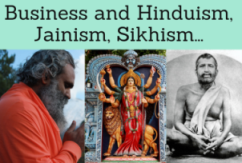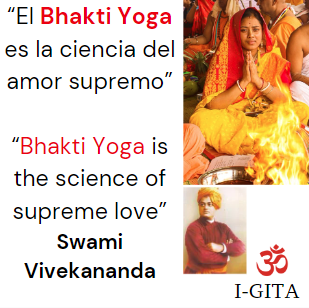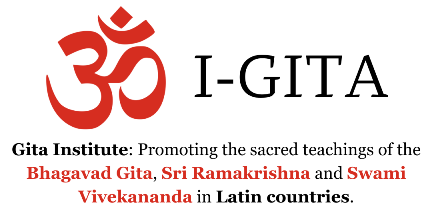Bhagavad Gita, Hinduism, Mahatma Gandhi
Ethical Principles of Hinduism (Bhagavad Gita) Heritage of Humanity
The Bhagavad Gita is one of the spiritual heritages of humanity; million Hindus read the Gita every day. The basic knowledge of the Bhagavad Gita will help us to better appreciate the ethical principles of Hinduism.
“Consider equal pleasure and pain, gain or loss, victory or defeat, and get ready for fight: proceeding thus you do not commit sin.” II-38 Sankhya Yoga
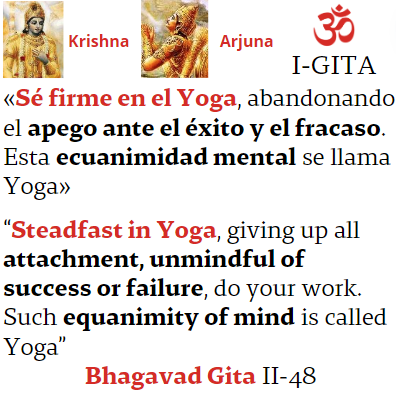

Religions and Global Business -
Religious diversity
- The Bhagavad Gita, one of the sacred books of Hinduism
- Comments on the Bhagavad Gita by Mahatma Gandhi
- Abandonment of the fruits of action, truthfulness, and non-violence
- Influences of the Bhagavad Gita on Hindu Civilization and other civilizations
Bhagavad Gita (Hinduism)
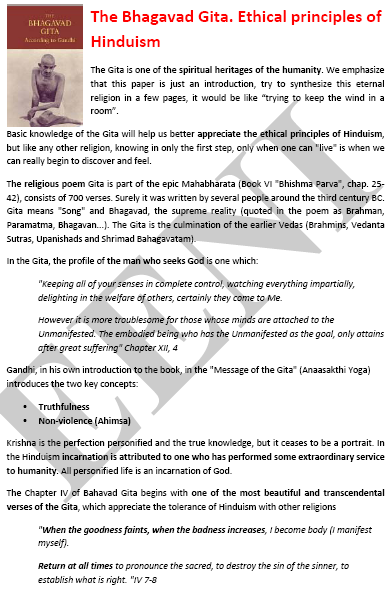



The Subject “Bhagavad Gita - Mahatma Gandhi” is included within the curriculum of the following academic programs at EENI Global Business School:
Bhagavad Gita Courses, Realization of the Gita
Master: Religions & Business

Doctorate: Ethics, Religion & Business.

 Masters adapted to Indian Students (Bharat).
Masters adapted to Indian Students (Bharat).
Why study “Hinduism and Business”?.
Languages:  or
or  Bhagavad Gita
Bhagavad Gita  Bhagavad Gita
Bhagavad Gita  Bhagavad Gita.
Bhagavad Gita.


An excellent way to know Hinduism is through the Bhagavad Gita, undoubtedly one of the most beautiful sacred poems in the history of humanity. For this analysis of the Bhagavad Gita; we have chosen “The Bhagavad Gita According to Gandhi” (The Gospel of Selfless Action) with commentaries of Gandhi on the Bhagavad Gita.
The Bhagavad Gita (Song of the Lord), or “Shrimad Bhagavad Gita Upanishad,” is a part of the Mahabharata and one of the most popular sacred texts of Hinduism. The Bhagavad Gita is considered a spiritual revelation was given by Sri Krishna.
For Mahatma Gandhi, the fundamental teaching of the Bhagavad Gita is detachment, abandonment of the fruits of the action.
“Keeping all of your senses in complete control, watching everything impartially, delighting in the welfare of others, certainly; they come to Me.” Bhagavad Gita XII- Yoga of Devotion,4
The Bhagavad Gita is the culmination of the earlier Vedas (Brahmins, Vedanta Sutras, Upanishads, and Shrimad Bahagavatam).
Gandhi, in his introduction to the book, in the “Message of the Bhagavad Gita” (Anaasakthi Yoga) explains the two fundamental concepts of Hinduism:

Gandhi was an example of a life based on Non-Violence - Ahimsa.
Philanthropy and Hinduism
According to Gandhi:
“The Bhagavad Gita shows how the true knowledge must be manifested in acts of selfless service.”
We can observe the importance of philanthropy, which as we will see in the Case Studies of Hindus Businessman will be common to all of them; they all have a sense of giving back to society part of what they have earned.
The teachings of the Bhagavad Gita have had an influence on West: Arthur Schopenhauer, Richard Wagner, Friedrich Nietzsche, Thomas Mann, Carl Jung, TS Elliot, and Leon Tolstoy. Julia Roberts, the guitarist John McLaughlin or the Beatle George Harrison converts to Hinduism.
“In the morning I wash my intelligence in the breathtaking and the cosmogonal thinking of the Bhagavad Gita.” Henry David Thoreau.
The Sermon on the Mount (Christianity) has influenced in Mahatma Gandhi:
“When I read the New Testament and the Sermon on the Mount, I began to understand the teachings of Christianity...
With the Sermon on the Mount, I fell in love of
Jesus” Mahatma Gandhi
“Mahatma Gandhi incarnates in his life certain universal principles that are inherent in the moral structure of the universe, and these principles are as ineluctable as the law of gravity.” Martin Luther King
Sri Ramakrishna was one of the major reformers of Hinduism in the 19th century.
The Mahatma Gandhi technology park is located in the Port of Abidjan (Ivory Coast).


(c) EENI Global Business School (1995-2025)
Top of this page










 WhatsApp
WhatsApp